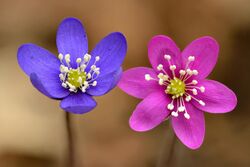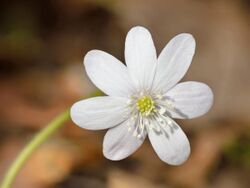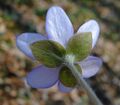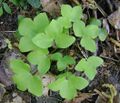Biology:Anemone hepatica
| Anemone hepatica | |
|---|---|
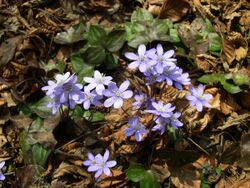
| |
| Scientific classification Error creating thumbnail: Unable to save thumbnail to destination
| |
| Kingdom: | Plantae |
| Clade: | Tracheophytes |
| Clade: | Angiosperms |
| Clade: | Eudicots |
| Order: | Ranunculales |
| Family: | Ranunculaceae |
| Genus: | Anemone |
| Species: | A. hepatica
|
| Binomial name | |
| Anemone hepatica | |
| Synonyms[1] | |
|
List
| |
Anemone hepatica (syn. Hepatica nobilis), the common hepatica, liverwort,[2] liverleaf,[3] kidneywort, or pennywort, is a species of flowering plant in the buttercup family Ranunculaceae, native to woodland in temperate regions of the Northern Hemisphere. This herbaceous perennial grows from a rhizome.
Description
Anemone hepatica grows 5–15 cm (2–6 in) high. Leaves and flowers emerge directly from the rhizome, not from a stem above ground.
The leaves have three lobes and are fleshy and hairless, 7–9 cm (2 3⁄4–3 1⁄2 in) wide and 5–6 cm (2–2 1⁄4 in) long. The upper side is dark green with whitish stripes and the lower side is violet or reddish brown. Leaves emerge during or after flowering and remain green through winter.
The flowers are blue, purple, pink, or white and appear in winter or spring. They have five to ten oval showy sepals and three green bracts.[citation needed]
Taxonomy
The taxonomy of the genus Anemone and its species is not fully resolved, but phylogenetic studies of many species of Anemone and related genera[4] indicate that species of the genus Hepatica should be included under Anemone because of similarities both in molecular attributes and other shared morphologies.[5] The circumscription of the taxon is also debated, some authors listing the North American var. acuta[6] and var. obtusa,[7] while other list them as the separate species A. acutiloba and A. americana, respectively.[8]
Varieties
Varieties of Anemone hepatica that are sometimes recognized include:[1]
- Anemone hepatica var. japonica, a synonym of Hepatica nobilis var. japonica Nakai, is native to the Russian Far East, China , Korea, and Japan [9][10]
- Anemone hepatica var. acuta, a synonym of Hepatica acutiloba DC., is native to eastern North America[11]
- Anemone hepatica var. obtusa, a synonym of Hepatica americana (DC.) Ker Gawl., is native to eastern North America[12]
Distribution and habitat
It is found in woods, thickets and meadows, especially in the mountains of continental Europe, North America and Japan.[citation needed]
Ecology
Hepatica flowers produce pollen but no nectar. In North America, the flowers first attract Lasioglossum sweat bees and small carpenter bees looking in vain for nectar. Then when the stamens begin to release pollen, the bees return to collect and feed on pollen. Mining bees sometimes visit the flowers, but prefer flowers that produce both nectar and pollen.[13][dubious ]
Toxicity
Like other Ranunculaceae, fresh liverwort contains protoanemonin and is therefore slightly toxic. By drying the herb, protoanemonin is dimerized to the non-toxic anemonin.[citation needed]
Uses
Medieval herbalists believed it could be used to treat liver diseases, and may be used in current folk medicine.[citation needed][14]
Under the name Hepatica nobilis, which is regarded as a synonym, this plant has gained the Royal Horticultural Society's Award of Garden Merit.[15]
Culture
It is the official flower of the Sweden Democrats political party in Swedish politics.[citation needed]
Gallery
References
- ↑ 1.0 1.1 "Anemone hepatica L.". The Plant List. Royal Botanic Gardens (Kew). http://www.theplantlist.org/tpl1.1/record/kew-2638271.
- ↑ Horace Kephart (1936). "Early Spring Flowers of the North Carolina Mountains". The Journal of the Southern Appalachian Botanical Club 1 (7): 77–83. doi:10.2307/4031043.
- ↑ "Hepatica nobilis | liverleaf Alpine Rockery/RHS Gardening" (in en-gb). http://www.rhs.org.uk/plants/8645/hepatica-nobilis/details.
- ↑ Sara B. Hoot; Anton A. Reznicek; Jeffrey D. Palmer (January–March 1994). "Phylogenetic Relationships in Anemone (Ranunculaceae) Based on Morphology and Chloroplast DNA". Systematic Botany 19 (1): 169–200. doi:10.2307/2419720.
- ↑ Dutton, Bryan E.; Keener, Carl S.; Ford, Bruce A. (1997), "Anemone", in Flora of North America Editorial Committee, Flora of North America North of Mexico (FNA), 3, New York and Oxford, http://www.efloras.org/florataxon.aspx?flora_id=1&taxon_id=101733
- ↑ "Anemone hepatica var. acuta (Pursh) Pritz. — The Plant List". http://www.theplantlist.org/tpl1.1/record/kew-2638272.
- ↑ "Hepatica nobilis var. obtusa (Pursh) Steyerm. — The Plant List". http://www.theplantlist.org/tpl1.1/record/kew-2845816.
- ↑ "GRIN-Global Web v 1.10.5.0". https://npgsweb.ars-grin.gov/gringlobal/taxonomylist.aspx?category=species&type=genus&value=Hepatica&id=5554.
- ↑ "Hepatica nobilis var. japonica Nakai". Royal Botanic Gardens, Kew. https://powo.science.kew.org/taxon/urn:lsid:ipni.org:names:77132909-1.
- ↑ "Anemone hepatica var. japonica - Hortipedia". http://en.hortipedia.com/wiki/Anemone_hepatica_var._japonica.
- ↑ "Hepatica acutiloba DC.". Royal Botanic Gardens, Kew. https://powo.science.kew.org/taxon/urn:lsid:ipni.org:names:711388-1.
- ↑ "Hepatica americana (DC.) Ker Gawl.". Royal Botanic Gardens, Kew. https://powo.science.kew.org/taxon/urn:lsid:ipni.org:names:711389-1.
- ↑ Heather Holm (2014). Pollinators on Native Plants. Minnetonka, MN: Pollinator Press. pp. 140–141.
- ↑ Howard, Michael (1987). Traditional Folk Remedies. Century. pp. 161–2.
- ↑ "Hepatica nobilis". Royal Horticultural Society. https://www.rhs.org.uk/Plants/8645/Hepatica-nobilis/Details.
- Pignatti, S. (1982). Flora d'Italia. 1. Edagricole. p. 277.
External links
Wikidata ☰ {{{from}}} entry
 |
